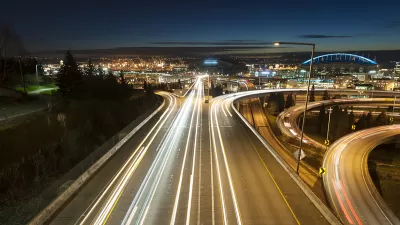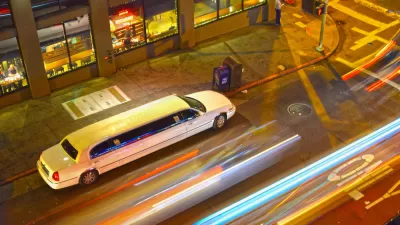As Seattle prepares a possible cordon area congestion pricing plan to tackle both traffic congestion and climate change, The Seattle Times did a poll on two applications of congestion pricing: urban tolls and adding express toll lanes to freeways.

The polling of two groups, Seattle residents and King County residents who live in the city's suburbs, was done by The Seattle Times Traffic Lab from Dec. 15-18, 2018.
Seventy percent of the Seattle-only group "said they either oppose or strongly oppose 'a toll to go into downtown Seattle as a way to reduce congestion and raise money for transit,'" reports David Gutman. Only 26 percent favored the idea of a cordon toll, similar to those used in London, Singapore, and Stockholm. The county residents opposed the cordon tolls by 73%.
Additional express toll lanes like those added to I-405 in September 2015 were also opposed, but by a slimmer majority, 61 percent among the county group, and surprising were supported by 37 percent of respondents. Forty-two percent of this group viewed tolls as "penalizing drivers who can’t afford to pay."
The idea was the second-least popular of seven transportation-related proposals that The Seattle Times polled and that local officials have discussed recently...Only allowing more apartment buildings to be built with no parking proved less popular.
What about climate action?
Respondents were only asked about tolling from a transportation or congestion perspective. In her April 4 announcement (posted here), Mayor Jenny Durkan notes that the cordon tolling plan was one of four strategies to reduce transportation emissions, which account for two-thirds of climate emissions in the city. The other three measures focused on transportation electrification.
The tolling plan was included in the city's climate action plan [pdf] (see page 14: Improving mobility through pricing), also unveiled last April.
Slow-moving plan in progress
Gutman notes that the cordon tolling plan "remains only in the research stages, and Durkan has said little publicly about it since her announcement nine months ago."
The last two city budgets have included a total of $1.2 million to study the idea. Tolling city streets would almost certainly require the approval of either the state Legislature or Seattle voters.
Of particular interest to congestion pricing advocates is Gutman's excellent recap of the Stockholm Congestion Charge, initially implemented in 2006, that was the subject of an unsuccessful referendum. "By 2014, two-thirds of the public and every major political party supported the tolls," he notes.
The poll questions and results are embedded in the source article as a document cloud.
Published the same: "Seattle Times poll finds strong support for more transit — but not bike lanes"
Related in Planetizen:
-
Getting the Politics of Cordon Tolling Right, April 20, 2018
-
Seattle to Consider Congestion Pricing, April 6, 2018
-
See several posts tagged "I-405 Express Toll Lanes."
FULL STORY: New poll: Tolling freeways, city streets deeply unpopular across the board in Seattle and King County

Maui's Vacation Rental Debate Turns Ugly
Verbal attacks, misinformation campaigns and fistfights plague a high-stakes debate to convert thousands of vacation rentals into long-term housing.

Planetizen Federal Action Tracker
A weekly monitor of how Trump’s orders and actions are impacting planners and planning in America.

In Urban Planning, AI Prompting Could be the New Design Thinking
Creativity has long been key to great urban design. What if we see AI as our new creative partner?

Pedestrian Deaths Drop, Remain Twice as High as in 2009
Fatalities declined by 4 percent in 2024, but the U.S. is still nowhere close to ‘Vision Zero.’

King County Supportive Housing Program Offers Hope for Unhoused Residents
The county is taking a ‘Housing First’ approach that prioritizes getting people into housing, then offering wraparound supportive services.

Researchers Use AI to Get Clearer Picture of US Housing
Analysts are using artificial intelligence to supercharge their research by allowing them to comb through data faster. Though these AI tools can be error prone, they save time and housing researchers are optimistic about the future.
Urban Design for Planners 1: Software Tools
This six-course series explores essential urban design concepts using open source software and equips planners with the tools they need to participate fully in the urban design process.
Planning for Universal Design
Learn the tools for implementing Universal Design in planning regulations.
planning NEXT
Appalachian Highlands Housing Partners
Mpact (founded as Rail~Volution)
City of Camden Redevelopment Agency
City of Astoria
City of Portland
City of Laramie




























